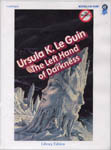
 The Left Hand Of Darkness
The Left Hand Of Darkness
By Ursula K. Le Guin ; Read by Ruth Stokesberry
8 Cassettes – Approx. 11.5 hours UNABRIDGED
Books On Tape
ISBN: 0736611290
Themes: / Science Fiction / Galactic Civilization / Sociology / Gender / Worldbuilding /
“…our entire pattern of socio-sexual interaction is non-existent here. The Gethenians do not see one another as men or women. This is almost impossible for our imaginations to accept. There is no division of humanity into strong and weak. One is respected and judged only as a human being…it is an appalling experience for a Terran.”
-Ong Tot Oppong’s field notes of the planet Winter
Genly Ai, the lone emissary of a galactic federation of planets, has landed on the planet named Winter. His job is to make first contact and offer membership to the federation. But Winter is a strange world. Its people are adapted to the chilly planet, use some highly technological devices and yet have a feudal political structure. Slightly complicating matters is the people themselves – they are all bisexual hermaphrodites.
The Left Hand of Darkness is a recognized classic of Science Fiction; it won both the Nebula and the Hugo awards for best novel for 1970. At its center this novel is a thought experiment, built to planetary proportions. This subgenre of HARD SF includes many great novels like Frank Herbert’s Dune and Robert Silverberg’s A Time Of Changes. It also acts in some manner as does a dystopia or utopia novel, shining light on those things hidden, in this case by gender politics, of the time in which it was written. In the late 1960’s and 1970’s women were just becoming fuller participants in power and business. The Left Hand of Darkness taps into this burgeoning social movement. Asking the question “What would a world look like where there were no gender politics at all?”. Le Guin’s answer is fascinating.
While at times slow and ponderous this is a great novel for its time. It is filled with almost endless detail of life on a fully thought out world. Of special note is a fully fleshed out and powerful series of reading of the mythology of Winter, it is superbly crafted stuff. I’m not a huge fan of Le Guin’s body of work but I did appreciate this audiobook. The central idea is very well thought out and the details show in her attention. At least in the abstract, the plot plays out much like a good Star Trek: The Next Generation episode. And there is good reason for this. Indeed, Star Trek: The Next Generation has dealt with both “first contact” situations in the episode aptly named “First Contact” and hermaphroditic aliens in the episode “The Outcast”. The fact that both of those episodes are among the best ST:TNG ever did tells you something about the themes. The Left Hand Of Darkness is not a great page turner, or in this case a tape flipper of a novel. And it is not simply the subject matter that bogs it down. Barry Longyear’s Enemy Mine deals with gender neuter aliens in a thrill-ride fashion that is sadly absent here. Nor does the political intrigue present in The Left Hand of Darkness keep you sitting in the car after you’ve got where your going, waiting for the tape to finish, like it does with the similar Frank Herbert’s Dune. But despite these criticisms, make no mistake, this is
a classic of SF.
Books On Tape did a fabulous job putting together this production. The stunning original cover of the paperback is featured on the plastic clamshell case. The reading is by Ruth Stokesberry, who although unknown to me before this is good at her job. But funnily enough I was immediately thrown off by her voice reading the male narrator’s lines. Typically in audiobooks, male protagonists are read by male readers, who then go into falsetto to read female character’s lines, in this case it is the opposite. And while this is somewhat jarring, it doesn’t have a negative effect as much as it puts the listener into the same situation as the protagonist. In short, it works. The reading itself includes a lengthy and absolutely fascinating introduction written by Ursula K. Le Guin and an appendix explaining the different names and formulas used to determine the months, years, and days of the week. This is a great example of how to make an audiobook.
 Best of Science Fiction and Fantasy Volume 1
Best of Science Fiction and Fantasy Volume 1 Time Bride
Time Bride  A Sound Of Thunder
A Sound Of Thunder The Terminal Experiment
The Terminal Experiment The Man In The High Castle
The Man In The High Castle